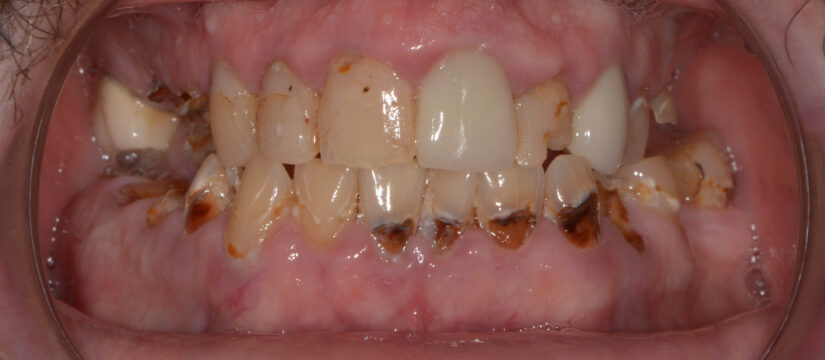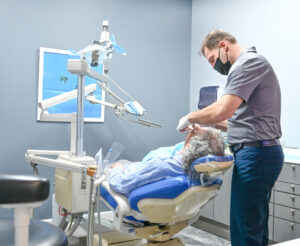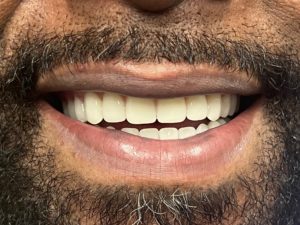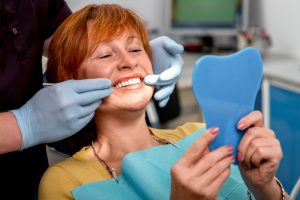
Tooth loss can be a life-changing event, impacting not only our ability to chew food but also our self-esteem and social interactions. Dentures offer a solution to restore both function and appearance, but the process involves removing teeth for dentures, which includes tooth extraction and adjustments to your new smile. Embracing this transition is essential to maintain a positive emotional health and improve your overall quality of life.
In this journey, we will delve into the tooth extraction process for dentures, the role of oral surgeons, and the importance of post-extraction care. We’ll also explore temporary and immediate dentures, their benefits, and how to adjust to them. Finally, we’ll discuss the emotional aspects of tooth loss and dentures, offering insights on building confidence with your new smile.
Key Takeaways
- Tooth extraction process for dentures involves collaboration between oral surgeons, dentists and denturists.
- Post-extraction care is essential to ensure successful transition to permanent or temporary dentures.
- Building confidence with the new smile requires focusing on positive benefits and engaging in activities that promote self-care & esteem.
The Tooth Extraction Process for Dentures
The tooth extraction process, an integral part of preparing for dentures, involves removing teeth to facilitate gum healing prior to getting dentures. The healing process typically takes 6 to 8 weeks for gum tissue and 6 to 8 months for sockets to fill in with new bone. Understandably, this period can be challenging for many patients, but it is a necessary phase to secure a proper fit for your new dentures.
During this process, oral surgeons have a pivotal role. They are dental professionals with specialized training in tooth extractions and related surgical procedures. Collaborating closely with dentists and denturists, they ensure a smooth and successful procedure, minimizing complications and guaranteeing proper healing.
Post-extraction care is of equal importance, as it mitigates the risk of infection and fosters healing of gum tissue and bone. Following tooth extraction, it is essential to maintain cleanliness of the extraction site, avoid strenuous activities for the first 24 hours, and adhere to a liquid or soft diet. Effective post-extraction care paves the way for a seamless transition to dentures.
Oral Surgeon’s Role
Oral surgeons are responsible for performing tooth extractions, including having teeth pulled, and overseeing the post-extraction care. Their expertise in handling difficult extractions and surgical procedures, such as removing impacted or broken teeth, makes them an invaluable part of the tooth extraction process for patients who need teeth extracted for dentures.
Collaborating with your dental professional at the dental office, oral surgeons ensure the procedure runs smoothly and potential complications are minimized, paving the way towards your new smile.
Post-Extraction Care
After tooth extraction, adhering to proper post-extraction care is paramount to facilitate optimal healing and prepare your gums for dentures. Here are some steps to follow:
- Gently rinse the extraction site with an antimicrobial solution.
- Refrain from rinsing, spitting, or using a straw for the first 24 hours.
- Use a salt-water mouthwash to aid in healing the socket.
- Limit activities such as exercise and lifting heavy items during the first 24 hours to allow a blood clot to form and stop bleeding, further promoting healing.
Additionally, it’s essential to follow a liquid or soft diet for the first 24 hours and avoid smoking, rinsing, spitting, or brushing for 24 hours to prevent a dry socket. Following these post-extraction care guidelines, you lay the groundwork for a smooth transition to dentures and establish the foundation for your new smile.
Temporary Dentures: A Bridge to Permanent Dentures
While waiting for your gums to heal from tooth extraction, temporary dentures can provide a convenient bridge to permanent dentures. These dentures are designed to be used during the healing period, allowing you to maintain a natural-looking smile and a more comfortable fit. Temporary dentures, also known as immediate dentures, are crafted from a hard acrylic material and are designed to accommodate the contours of your mouth.
Denture Centers offer various temporary denture options, including conventional dentures, immediate dentures, or eventual dentures secured by dental implants. Temporary dentures usually last for six to eight months, providing adequate strength and functionality during this transitional period.
Benefits of Temporary Dentures
Temporary dentures offer several advantages during the healing process. They protect the gums and underlying bone from further damage, while also supporting the remaining teeth and helping the gums heal.
Utilizing temporary dentures offers several benefits:
- Bypassing the challenges of adapting to wearing dentures when your gums are still tender
- Ensuring a more comfortable fit when you receive your permanent dentures
- Serving as a valuable stepping stone in your journey towards a complete mouth restoration
Adjusting to Temporary Dentures
It’s important to allow yourself ample time to become accustomed to temporary dentures. This adjustment period can vary, but it typically takes a few weeks to become accustomed to them. During this time, it’s recommended to practice speaking and eating with the dentures, as well as maintaining proper oral hygiene to ensure successful adjustment.
To aid this adjustment period, consider engaging in speech and mastication exercises and using denture adhesives for secure placement. Regular dental visits and cleaning are crucial for optimal denture health. Following these steps, you’re setting yourself up for a successful adaptation to your temporary dentures and preparation for the transition to permanent dentures.
Immediate Dentures: A Same-Day Solution
For those who want to avoid waiting for permanent dentures, immediate dentures offer a same-day solution. These dentures are placed directly following tooth extraction, eliminating the need for a healing period for the gums. However, obtaining immediate dentures requires multiple visits to take measurements and make bite impressions, ensuring the dentures match your natural teeth.
While convenient, immediate dentures may necessitate some teeth extractions prior to the procedure, such as back molars or impacted teeth, to allow sufficient time for the mouth to heal. Despite this, immediate dentures provide an expedient alternative for those eager to restore their smile without the wait.
Pros and Cons of Immediate Dentures
Immediate dentures come with their own set of advantages and disadvantages. On the plus side, they provide a fresh smile right after teeth extraction and protect the extraction site. Patients can experience improved self-confidence and more active engagement in life due to an enhanced smile.
On the other hand, immediate dentures typically come with a higher price tag than traditional dentures, as adjustments and relining may be required. These additional costs and potential discomfort should be taken into consideration when deciding if immediate dentures are the right choice for you.
Determining If You’re a Good Candidate
Determining if you’re a good candidate for immediate dentures involves several factors, such as the complexity of the treatment and any additional oral procedures that may be required. Your dentist and oral surgeon will assess several factors before you receive immediate dentures after extraction. Other dental professionals may be involved in the assessment process as well..
Weighing the pros and cons of immediate dentures and seeking advice from your dental professional can assist in making an informed decision about this same-day solution for your needs.
Permanent Dentures: Restoring Your Smile
Once your gums have healed and you’ve adjusted to temporary or immediate dentures, it’s time to move on to permanent dentures. These dentures are designed to provide a long-lasting solution to tooth loss, restoring your smile and offering various types to suit individual needs.
Permanent dentures encompass full dentures, partial dentures, and implant-supported dentures. Restoring your smile with permanent dentures can have a significant positive impact on your life. Not only do they improve your facial appearance, but they also help you regain the ability to speak and chew, enhancing your overall quality of life.
Types of Permanent Dentures
There are two main types of permanent dentures: traditional and implant-supported dentures. Traditional dentures rely on suction or adhesives to hold them in place, while implant-supported dentures are retained by titanium implants. Each type presents its own set of benefits and drawbacks, so evaluating your options and seeking advice from your dental professional is crucial before making a decision.
Traditional dentures can present challenges such as the need for frequent relining due to jawbone shrinkage during recovery, which can lead to the prosthetics becoming loose and causing difficulties.
Implant-supported dentures, on the other hand, offer a long-term solution to tooth loss, providing natural-looking and feeling teeth that can last a lifetime when proper dental hygiene and regular checkups are maintained. However, they also come with a higher initial expense and a lengthier procedure.
Caring for Your Permanent Dentures
Maintaining the function and appearance of your permanent dentures necessitates proper care. Regular brushing, similar to that of natural teeth, is crucial to uphold the performance and aesthetics of the dentures.
Additionally, proper care can help prevent dental issues such as gum disease, ensuring all your teeth and your new smile stays healthy and beautiful for years to come.
Emotional Health and Dentures
Tooth loss and the subsequent transition to dentures can have a profound impact on your emotional health. Research has shown that tooth loss can evoke intense emotional distress, such as feelings of sadness, depression, and a sense of loss. Moreover, tooth loss can affect your self-esteem, confidence, and general well-being, potentially impacting your relationships and ability to interact with others.
Grasping the emotional aspects of tooth loss and dentures is vital for managing this significant life event. By acknowledging the psychological effects and taking steps to build confidence with your new smile, you can improve your emotional well-being and embrace the benefits that dentures provide.
The Psychological Effects of Tooth Loss
The psychological effects of tooth loss can be significant, including:
- Intense emotional distress
- Depression
- Decrease in self-confidence and self-esteem
- Feelings of embarrassment and insecurity
- Impact on social interactions and overall quality of life.
Furthermore, tooth loss can have considerable consequences on dental health, including difficulty eating and speaking, and an increased risk of gum disease and other dental problems.
Recognizing these psychological effects and addressing them forms an integral part of your journey towards restoring your smile with dentures. By understanding the emotional impact of tooth loss, you can take steps to manage these feelings and work towards regaining your confidence.
Building Confidence with Your New Smile
Building confidence with your new smile involves adjusting to your dentures and embracing the benefits they provide. Dentures can help:
- Improve facial appearance
- Restore a natural smile
- Replace missing teeth
- Enhance self-esteem
- Improve ability to speak and chew
Focusing on the positive facets of dentures and maintaining good oral hygiene can help you regain your confidence and adapt to your new dentures.
Some strategies to help manage the psychological effects of tooth loss and dentures include seeking professional counseling, joining a support group, and engaging in activities that promote self-care and self-esteem. Addressing the emotional aspects of tooth loss and dentures can enhance your emotional well-being and enable you to fully embrace the benefits of your new smile.
Summary
Tooth loss and the transition to dentures can be a challenging journey, but with the right information and support, it’s possible to restore your smile and improve your emotional well-being. From tooth extraction and the role of oral surgeons to temporary and permanent dentures, understanding the process is essential for a successful outcome.
Embrace the benefits that dentures provide, such as improved facial appearance, restored natural smile, and better ability to speak and chew. By acknowledging the emotional aspects of tooth loss and dentures, and taking steps to build confidence with your new smile, you can conquer this life-changing event and enjoy a renewed sense of self-esteem and well-being.
Frequently Asked Questions
Is it painful to have teeth pulled for dentures?
Though there may be some pressure during a tooth extraction procedure, you won’t feel any pain as local anesthetics are used to manage it. You may experience a brief prick from the needle, but no further discomfort.
How many teeth can be pulled at once for dentures?
Dentists typically advise patients to have all their teeth extracted at one time. However, depending on the patient’s condition, there is no limitation on how many teeth can be taken out during a single dental appointment.
What happens when you have your teeth removed for dentures?
Having your teeth removed for dentures is a traumatic experience, but the gum tissue begins to heal within 14-21 days and new bone will nearly fill the hole after 10 weeks.
How long does it take for gums to heal after tooth extraction for dentures?
It typically takes 1 to 2 weeks for gums to heal completely after tooth extraction for dentures.
What is the role of an oral surgeon in the tooth extraction process?
An oral surgeon’s role in the tooth extraction process is to perform the extraction and ensure proper post-extraction care.






